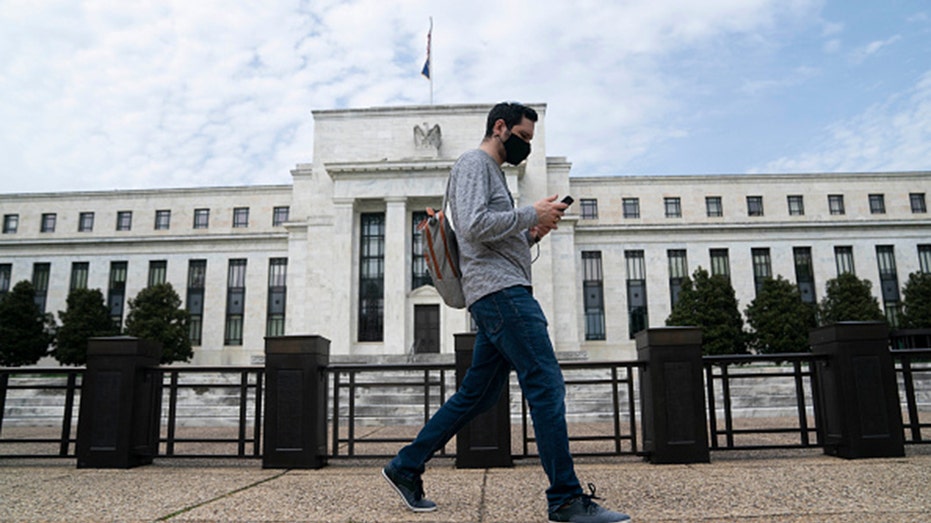US economy will slow markedly but dodge a recession as Fed hikes rates, Goldman predicts
Goldman Sachs: A recession is not off the table next year
Biden's inflation plan leaves the Federal Reserve in ‘terrible’ position: Holtz-Eakin
Former Congressional Budget Office director Douglas Holtz-Eakin weighs in on high inflation rates and strategizes practical solutions on 'Cavuto: Coast to Coast.'
Goldman Sachs economists expect the Federal Reserve to bring the U.S. economy to a grinding halt in order to cool inflation, but believe central bank policymakers may be able to successfully pull off their aggressive rate hike plan without dragging the country into a recession.
In a Monday analyst note, strategists led by Jan Hatzius said that while there are signs of the labor market cooling off, core inflation is also decelerating as pandemic-related disruptions in the economy begin to fade.
HOW THE FEDERAL RESERVE MISSED THE MARK ON SURGING INFLATION
With supply chain snarls starting to ease, trillions of dollars in government stimulus quickly depleting and more workers likely to return to the labor force soon, the Fed may not have to raise interest rates as quickly as some economists feared, Hatzius wrote. Although the unexpected slowdown in first-quarter growth suggests "that near-term recession risk has increased in a mechanical sense," the strategists said that other activity measures "imply that output is still expanding."
Although inflation remains near a 40-year high, the labor market has continued to add jobs at a brisk pace while consumers, flush with a cash surplus, have kept spending money on everyday goods.

A man wearing a mask walks past the U.S. Federal Reserve building in Washington D.C., the United States, on April 29, 2020. ((Xinhua/Liu Jie via Getty Images) / Getty Images)
The Goldman analysts said the Fed still needs to take strong action to ensure that wage growth does not surge, creating a wage-price spiral that pushes inflation even higher. The central bank will need to reduce economic growth by about 1% to 1.5% in order to successfully bring down labor demand and rebalance the labor market.
"Decline in labor demand does not require a recession, but does require over a year of below-potential growth," Hatzius wrote. "This implies that there is a coherent but narrow path for a soft landing."
WHAT IS A RECESSION, AND SHOULD AMERICANS BE WORRIED?
There are growing fears on Wall Street that the Fed may drag the economy into a recession as it seeks to tame inflation, which climbed by 8.3% in April, near a four-decade high. Bank of America, as well as Fannie Mae and Deutsche Bank, are among the Wall Street firms forecasting a downturn in the next two years, along with former Fed Chairman Ben Bernanke.
Goldman Sachs has not fully ruled out the possibility of a recession, particularly if pandemic-related inflation drivers do not cool off as expected.
"If wage growth and job openings do not normalize on their own at all, the reduction in labor demand required to restore balance to the labor market would likely entail a recession," they wrote.

Federal Reserve Board Chair Jerome Powell testifies on the economic outlook, on Capitol Hill in Washington, Wednesday, Nov. 13, 2019. ((AP Photo/Jose Luis Magana) / AP Newsroom)
They projected the Fed will raise the short-term interest rate to a range between 3% and 3.25% by 2023, up from the current level of 0.75% to 1%. That would mean the central bank – which already hiked rates by a half-basis point in May for the first time in two decades – raises rates at every meeting this year, including three more half-point increases.
"In terms of near-term communication, there is little incentive for Fed officials to deviate from their relatively hawkish framing of the last few months," the economists wrote.
Fed Chairman Jerome Powell has acknowledged there could be some "pain associated" with reducing inflation and curbing demand but pushed back against the notion of an impending recession, identifying the labor market and strong consumer spending as bright spots in the economy. Still, he has warned that a soft landing is not assured.
CLICK HERE TO READ MORE ON FOX BUSINESS
"It's going to be a challenging task, and it's been made more challenging in the last couple of months because of global events," Powell said recently during a Wall Street Journal live event, referring to the Ukraine war and COVID lockdowns in China.
But he added that "there are a number of plausible paths to having a soft or soft-ish landing. Our job isn't to handicap the odds, it's to try to achieve that."





















